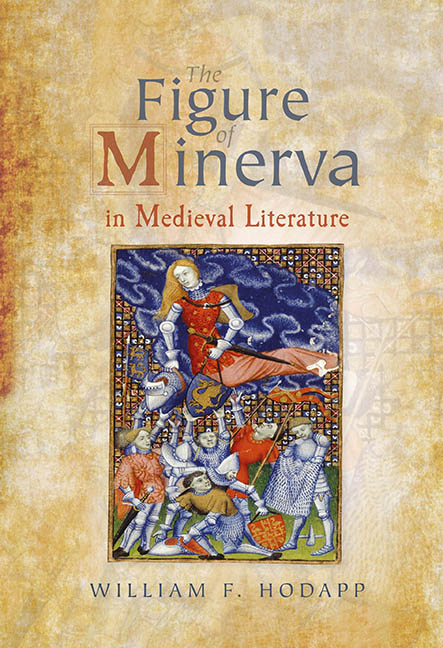Book contents
- Frontmatter
- Dedication
- Contents
- Illustrations
- Acknowledgements
- Abbreviations
- Introduction
- 1 The Roman Minerva and Elements of Medieval Classicism
- 2 The Sapiential Tradition: Minerva as Redemptress
- 3 The Martianus Tradition: Minerva as Mistress of the Liberal Arts
- 4 The Patrona Tradition: Minerva as Protectress and Benefactor
- 5 The Patristic Tradition: Minerva as Idol
- 6 The Ovidian Tradition: Minerva as Venus’ Ally
- Conclusion
- Bibliography
- Index
4 - The Patrona Tradition: Minerva as Protectress and Benefactor
Published online by Cambridge University Press: 17 October 2019
- Frontmatter
- Dedication
- Contents
- Illustrations
- Acknowledgements
- Abbreviations
- Introduction
- 1 The Roman Minerva and Elements of Medieval Classicism
- 2 The Sapiential Tradition: Minerva as Redemptress
- 3 The Martianus Tradition: Minerva as Mistress of the Liberal Arts
- 4 The Patrona Tradition: Minerva as Protectress and Benefactor
- 5 The Patristic Tradition: Minerva as Idol
- 6 The Ovidian Tradition: Minerva as Venus’ Ally
- Conclusion
- Bibliography
- Index
Summary
The image of Minerva patrona, protectress and benefactor, is rooted in Greco- Roman culture much as Minerva magistra artium liberalium. As patrona, however, Minerva directly enters the political arena, manifesting in two key ways: patroness of the city-state and patroness of the prince. Greco-Roman stories of her patronage of city-states take three forms: her contest with Neptune over who would name Athens and be its chief benefactor, a role she secured with the gift of an olive tree; her protection of Troy in the form of the Palladium, with which Troy would never fall and without which it could never stand; and her ongoing protection of Rome, the new home of the Palladium, and by extension the Republic and subsequently the Empire. We see this role expressed generally in the brief Homeric hymn 11, where the poet invokes her as protectress of city and army in a prayer for future success (11.1–5). Her patronage of the prince, on the other hand – a sort of political microcosm of her macrocosmic protection of the state – is perhaps most familiar from Pallas Athena's role in the Homeric corpus. Again, as noted earlier, in the Iliad she takes a particular interest in Diomedes and Odysseus during their night raid on the Thracian camp, counseling moderation that leads to military success and personal survival (10.503–14). And her direct interventions in the Odyssey – supporting Telemachos in his journey to seek his father and Odysseus in his return to Ithaka (passim) – help restore familial and political order to Odysseus’ society. Writing circa 468 BCE, Aeschylus in the Oresteia offers yet another instance of her patronage of a prince when the goddess directly aids Orestes’ cause by establishing the areopagus and placating the Erinyes with a new home near Athens (Eumenides 397–1031). As these stories suggest, her patronage of the prince, who under her tutelage rightly orders himself and performs his duties, can by extension affect the order of society as well. Though medieval writers exhibit interest in her patronage of city-states, they seem particularly keen on her involvement with princes. In this chapter, I explore Minerva as protectress and benefactor by first reviewing instances of the goddess’ patronage of specific princes evident in Roman literature. This work offers a basis for exploring similar instances in medieval literature from Walter of Châtillon's Alexandreis to Christine de Pizan's L'Epìstre d'Othea.
- Type
- Chapter
- Information
- The Figure of Minerva in Medieval Literature , pp. 120 - 161Publisher: Boydell & BrewerPrint publication year: 2019



